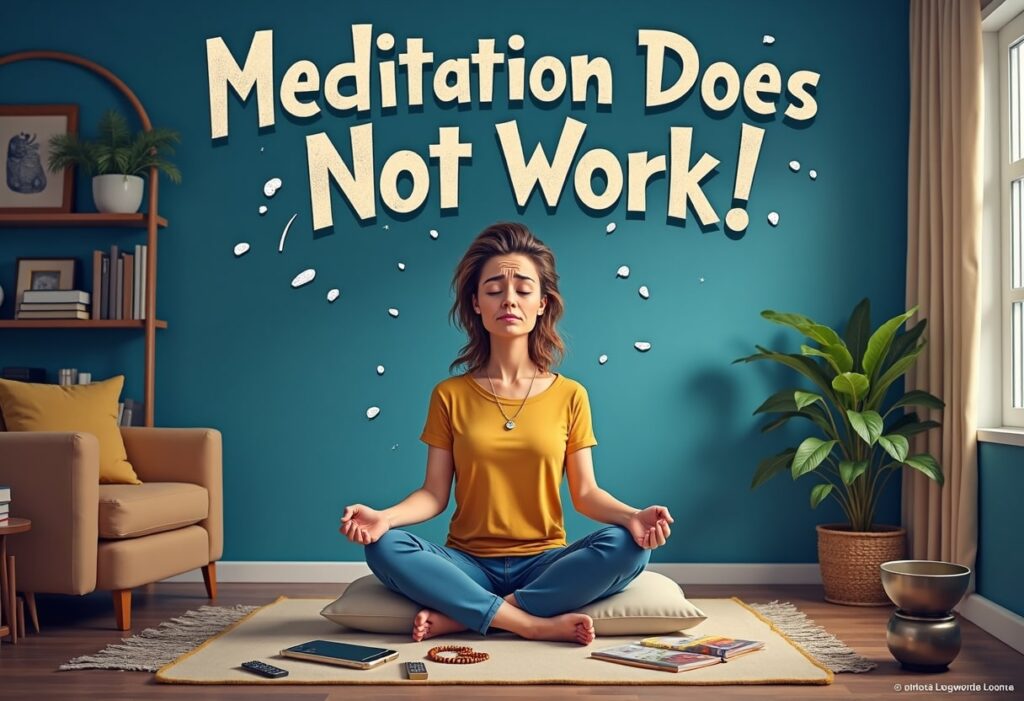
(NB Links may be affiliate links. See my disclosure here)
If you’ve ever thought that meditation does not work for you, you’re not wrong. Many people struggle with making meditation work for them.
But equally, meditation has been a life-saver for millions of people that grounds them, calms them and helps them face life’s challenges.
So perhaps the people who find it beneficial have adjusted their mindset whenever one of the reasons came up?
Meditation Does Not Work!
“Sometimes I wonder if I’m doing it wrong—if maybe meditation just isn’t meant for someone like me.”
That quiet, uncertain thought has passed through countless minds in the stillness before pressing play on another guided meditation.
Meditation, in all its promised peace and clarity, can sometimes feel like an unreachable ideal. Something perfect people do in perfect silence while the rest of us wrestle with noise, distraction, and doubt.
Beneath the surface of calm breathing and mindfulness apps lies a sea of unspoken frustration within people trying to sit still with themselves, only to feel even more restless.
At its core, the struggle with meditation isn’t about discipline but more about being human. But that doesn’t make the pain any less real.
Here are 25 of the deepest pain points people face with meditation, paired with the quiet internal monologues that often linger behind closed eyelids and closed hearts.
Overthinking the process – “I can’t stop thinking even when I meditate. Isn’t meditation supposed to quiet my mind?”
Feeling like there’s a right or wrong way – “Maybe I’m not meditating correctly. Everyone else seems more Zen than me.”
Impatience with progress – “Why don’t I feel calm yet? I’ve been trying meditation for weeks.”
Intimidation by perfection – “Real meditators probably wake up at 5 AM and sit in silence for hours. I can barely focus for two minutes.”
Discomfort with stillness – “Every time I sit down to meditate, I just feel twitchy, bored, or anxious.”
Struggling with guilt or self-blame – “If I can’t even focus on my breathing, how can I ever handle my life?”
Expecting immediate transformation – “All these people say meditation changed their lives. Maybe it just doesn’t work for me.”
Fear of confronting inner thoughts – “When I meditate, all the stuff I’ve been avoiding comes up. It’s too much to sit with.”
Comparing oneself to others – “They seem so peaceful after meditating. I just feel the same inside.”
Feeling unsure of what to focus on – “Am I supposed to follow the breath or clear my mind? I never know if I’m doing it right.”
Inconsistency and self-doubt – “I can’t seem to make meditation a habit. Maybe I’m just not disciplined enough.”
Overwhelm from information overload – “There are so many types of meditation:mindfulness, transcendental, loving-kindness. How do I know which one’s right for me?”
Frustration with physical discomfort – “My back hurts after five minutes. Maybe meditation isn’t for my body type.”
Disbelief in benefits – “I don’t feel any different after meditating. Is all this mindfulness stuff overrated?”
Time scarcity and guilt – “I barely have time for work and family. Sitting quietly feels like wasting time.”
Association with spiritual elitism – “All this talk about enlightenment feels out of reach. I just want to feel a little less stressed.”
Resistance to vulnerability – “Meditation makes me feel exposed—like I’m watching myself without filters. It’s uncomfortable.”
Shame from giving up – “I’ve tried meditation before and quit. Why would this time be different?”
Doubt in self-worth – “I don’t think I deserve peace. Meditation feels like something for people who already have their life together.”
Frustration with wandering thoughts – “My mind keeps running away. No matter how often I bring it back, it never stays still.”
Fear of emotional depth – “Sometimes meditation feels like opening a door I’m not ready to walk through.”
Feeling disconnected from progress – “I know it’s supposed to help over time, but I can’t see or measure any results.”
Judging oneself harshly – “If I can’t even slow down for ten minutes, maybe I’m just hopeless at self-care.”
Hidden grief or trauma resurfacing – “When I get quiet, memories I’ve buried come up, and it scares me.”
Believing calm is unreachable – “Maybe inner peace is just another thing other people get to have.”
If you’ve seen yourself in even one of these thoughts, you’re far from alone.
Every one of them would lead you to think that meditation does not work.
But meditation isn’t a perfect science, it’s a mirror. It reflects our impatience, insecurity, and the chaos we’d rather not sit with.
And that’s precisely why it’s powerful.
People often forget that meditation isn’t the art of silence. It’s more like the art of noticing noise without becoming it. The agitation, the guilt, the fear are all part of the curriculum.
But we live in a culture obsessed with progress. We measure success in milestones, in apps that count “streaks,” in how Zen we look on the outside. So when meditation feels messy, we translate that messiness into failure rather than growth.
Maybe the real problem isn’t meditation but the way we expect it to rescue us. We come to it hoping it will erase anxiety, heal the mind, or give us control. But meditation doesn’t erase anything; it teaches us how to sit beside what hurts and breathe anyway.
When you’re new to meditation, the battle isn’t with silence: it’s with the parts of yourself that crave certainty.
Those parts whisper, “You’re doing it wrong” or “This isn’t working.” But the truth is, there’s no medal for stillness. There’s only the quiet courage to begin again, over and over, even when it feels pointless.
Try softening your approach: instead of meditating perfectly, meditate honestly. Notice how resistance shows up in your body. Notice the urge to escape. Notice the quiet moment before you open your eyes again and recognize that this noticing is the practice. Every imperfect breath counts.
Sometimes the most radical act of self-compassion isn’t clearing your mind but giving yourself permission not to. It’s showing up for ten messy seconds of awareness without demanding transcendence.
Meditation isn’t about escaping your humanness; it’s about returning to it. The stillness we chase isn’t out there somewhere, it’s waiting beneath the noise, quietly, patiently, even when you think you’ve lost the way.
And maybe that’s the simplest truth of all: you were never failing at meditation. You were just learning how to listen to yourself more deeply than ever before.
I use audio brainwave entrainment (binaural beats and isochronic tones) to help with my meditation and to gently nudge my mind into accepting the stillness.
I use, and will happily recommend, these two resources. Click the links to find out more.
Zen12 – if you don’t have a lot of time, Zen12 offers 12 months of audio files lasting just 12 minutes that can help start your meditation journey.
Read my Zen12 Review here, or Check out the official Zen12 page here.
iAwake Profound Meditation Program 3.0 is a fully fledged program that will build a powerful meditation practice for you.
Read my iAwake PMP 3.0 Review here, or Check out the official iAwake PMP 3.0 page here.
I hope you enjoyed Meditation Does Not Work! It’s a provocative title because, obviously I think it does.
Please consider leaving a comment to let me know!



